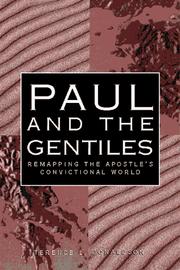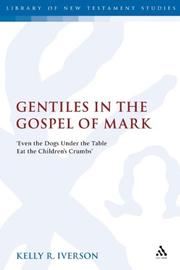| Listing 1 - 10 of 32 | << page >> |
Sort by
|
Book
ISBN: 9783772086564 377208656X Year: 2018 Publisher: Tübingen Narr Francke Attempto
Abstract | Keywords | Export | Availability | Bookmark
 Loading...
Loading...Choose an application
- Reference Manager
- EndNote
- RefWorks (Direct export to RefWorks)
Back cover: This exciting new interpretation of Paul's Letter to the Romans approaches Paul's most famous letter from one of the newest scholarly positions within Pauline Studies: The Radical New Perspective on Paul (also known as Paul within Judaism). As a point of departure, the author takes Paul's self-designation in 11:13 as apostle to the Gentiles as so determining for Paul's mission that the audience of the letter is perceived to be exclusively Gentile. The study finds confirmation of this reading-strategy in the letters construction of the interlocutor from chapter 2 onwards. Even in 2:17, where Paul describes the interlocutor as someone who calls himself a Jew, it requests to perceive this person as a gentile who presents himself as a Jew and not an ethnic Jew. If the interlocutor is perceived in this way throughout the letter, the dialogue between Paul and the interlocutor can be perceived as a continuous, unified and developing dialogue. In this way, this interpretation of Romans sketches out a position against a more disparate and fragmentary interpretation of Romans.
Gentiles in the New Testament --- Paul, --- Bible. --- Criticism, interpretation, etc.

ISBN: 0800629930 Year: 1997 Publisher: Minneapolis (Minn.): Fortress
Abstract | Keywords | Export | Availability | Bookmark
 Loading...
Loading...Choose an application
- Reference Manager
- EndNote
- RefWorks (Direct export to RefWorks)
Gentiles in the New Testament --- Paul, --- Bible. --- Theology.
Book
ISBN: 9780190271756 9780190271763 Year: 2016 Publisher: New York, NY Oxford University Press
Abstract | Keywords | Export | Availability | Bookmark
 Loading...
Loading...Choose an application
- Reference Manager
- EndNote
- RefWorks (Direct export to RefWorks)
Paul and the Gentile Problem provides a new explanation for the apostle Paul's statements about the Jewish law in his letters to the Romans and Galatians. Paul's arguments against circumcision and the law in Romans 2 and his reading of Genesis 15-21 in Galatians 4:21-31 belong within a stream of Jewish thinking which rejected the possibility that gentiles could undergo circumcision and adopt the Jewish law, thereby becoming Jews. Paul opposes this solution to the gentile problem because he thinks it misunderstands how essentially hopeless the gentile situation remains outside of Christ. The second part of the book moves from Paul's arguments against a gospel that requires gentiles to undergo circumcision and adoption of the Jewish law to his own positive account, based on his reading of the Abraham Narrative, of the way in which Israel's God relates to gentiles. Having received the Spirit (pneuma) of Christ, gentiles are incorporated into Christ, who is the singular seed of Abraham, and, therefore, become materially related to Abraham. But this solution raises a question: Why is it so important for Paul that gentiles become seed of Abraham? The argument of this book is that Paul believes that God had made certain promises to Abraham that only those who are his seed could enjoy and that these promises can be summarized as being empowered to live a moral life, inheriting the cosmos, and having the hope of an indestructible life.
Jews in the New Testament --- Gentiles in the New Testament --- Bible. --- Criticism, interpretation, etc.
Book
ISBN: 3727808217 Year: 1992 Publisher: Freiburg Universitätsverl.
Abstract | Keywords | Export | Availability | Bookmark
 Loading...
Loading...Choose an application
- Reference Manager
- EndNote
- RefWorks (Direct export to RefWorks)
Gentiles in the New Testament --- Jews in the New Testament --- Sociology, Biblical --- Bible. --- Criticism, interpretation, etc.
Book
ISBN: 3460005513 Year: 2006 Publisher: Stuttgart Katholisches Bibelwerk
Abstract | Keywords | Export | Availability | Bookmark
 Loading...
Loading...Choose an application
- Reference Manager
- EndNote
- RefWorks (Direct export to RefWorks)
Church --- Gentiles in the New Testament --- Israel (Christian theology) --- Jews in the New Testament --- Biblical teaching --- Bible. --- Criticism, interpretation, etc.
Book
ISBN: 9781137281135 Year: 2012 Publisher: New York Palgrave Macmillan
Abstract | Keywords | Export | Availability | Bookmark
 Loading...
Loading...Choose an application
- Reference Manager
- EndNote
- RefWorks (Direct export to RefWorks)
"How is it possible that the apostle Paul calls one and the same group of Gentile readers Jews, Gentiles, and neither Jews nor Gentiles without skipping a beat? Joshua Garroway has a solution. Garroway sees Paul caught up in the ancient debate over Jewish identity. Convinced his baptized charges had become Jews, yet unable to describe that transformation without invoking and confirming standard notions of Jewishness, Paul constructed a hybrid Gentile-Jewish identity. This novel approach to Paul invites fresh interpretations of Paul's letters, particularly Romans, and allows Garroway to reimagine Paul's role in the historical development of Christianity"--
Christians --- Gentiles in the New Testament --- Identification (Religion) --- Jews in the New Testament --- Biblical teaching --- Bible. --- Criticism, interpretation, etc.
Book
ISBN: 056769819X 9780567694089 9780567698193 0567694089 Year: 2021 Publisher: London: T&T Clark International,
Abstract | Keywords | Export | Availability | Bookmark
 Loading...
Loading...Choose an application
- Reference Manager
- EndNote
- RefWorks (Direct export to RefWorks)
With contributions ranging from remapping Paul within Jewish ideologies, and Paul among friends and enemies, to socio-cultural readings of Matthew, and construction of Christian Identity through stereotypes of the Scribes and Pharisees, this book provides a multi-scholar tribute to Terrence Donaldson's accomplishments around a core theme.

ISBN: 0567031314 9780567031310 Year: 2007 Volume: 339 Publisher: London: T&T Clark International,
Abstract | Keywords | Export | Availability | Bookmark
 Loading...
Loading...Choose an application
- Reference Manager
- EndNote
- RefWorks (Direct export to RefWorks)
Gentiles in the New Testament. --- 226.3 --- Evangelie volgens Marcus --- Gentiles in the New Testament --- Bible. --- Marco (Book of the New Testament) --- Mark (Book of the New Testament) --- Markus (Book of the New Testament) --- Markusevangelium --- Vangelo di Marco --- Book of Mark --- Criticism, interpretation, etc.
Book
ISSN: 01709240 ISBN: 3631429819 9783631429815 Year: 1992 Volume: 69 Publisher: Frankfurt am Main: Lang,
Abstract | Keywords | Export | Availability | Bookmark
 Loading...
Loading...Choose an application
- Reference Manager
- EndNote
- RefWorks (Direct export to RefWorks)
Gentiles in the New Testament --- Jews in the New Testament --- Gentils dans le Nouveau Testament --- Juifs dans le Nouveau Testament --- Bible. N.T. Romans --- Bible. --- Criticism, interpretation, etc --- Critique et interprétation --- Gentiles in the New Testament. --- Jews in the New Testament. --- Criticism, interpretation, etc.
Book
ISBN: 0567694100 0567694119 0567694097 9780567694119 9780567694089 9780567694096 9780567698193 Year: 2020 Publisher: London ; [London, England] : T&T Clark, Bloomsbury Publishing,
Abstract | Keywords | Export | Availability | Bookmark
 Loading...
Loading...Choose an application
- Reference Manager
- EndNote
- RefWorks (Direct export to RefWorks)
"With contributions ranging from remapping Paul within Jewish ideologies, and Paul among friends and enemies, to socio-cultural readings of Matthew, and construction of Christian Identity through stereotypes of the Scribes and Pharisees, this book provides a multi-scholar tribute to Terrence Donaldson's accomplishments around a core theme"--
Gentiles in the New Testament. --- Jews in the New Testament. --- Judaism --- Christianity and other religions --- Relations --- Christianity. --- Judaism. --- Paul, --- Matthew, --- Donaldson, Terence L. --- Bible. --- Criticism, interpretation, etc. --- Socio-rhetorical criticism.
| Listing 1 - 10 of 32 | << page >> |
Sort by
|

 Search
Search Feedback
Feedback About UniCat
About UniCat  Help
Help News
News